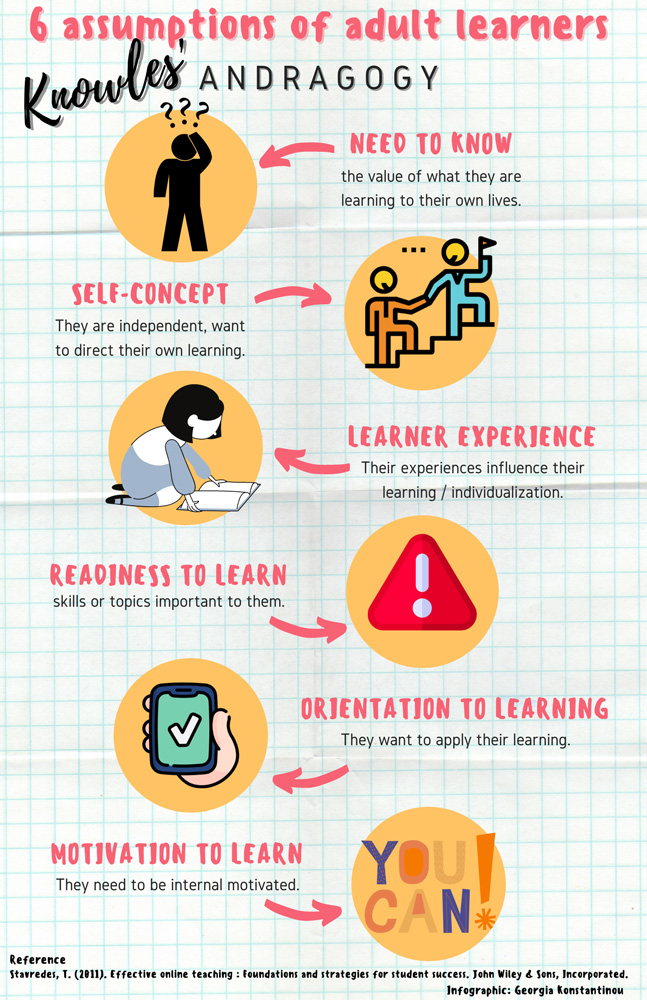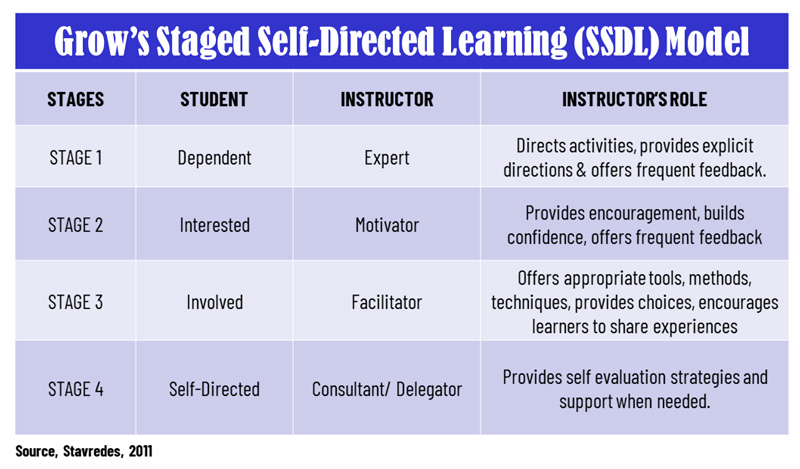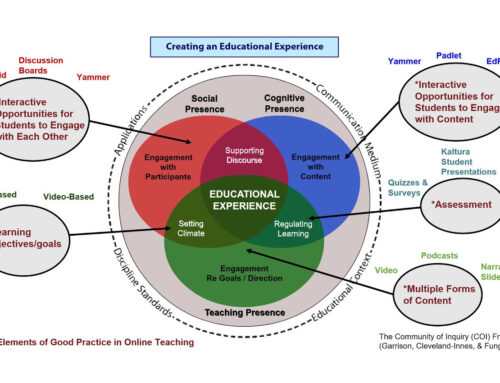a. Knowles’ 6 Assumptions for adult learners
Summarize the six key assumptions about adult learners as described by Malcolm Knowles and discuss their implications for teaching adult learners online.
Malcolm Knowles identified a learning approach that he considered was more suited to the unique needs of adult learners. He called this approach andragogy, an ancient Greek compound word formed from the terms ἀνδρ- (= man) and ἄγω/ἀγωγός (= lead/leader) that means “lead/leader of men”. Knowles wanted to distinguish this term from the term pedagogy, another ancient Greek word deriving from the words παῖς = (kid) and ἄγω/ἀγωγός (= lead/leader) that means “lead/leader of kids/children”. Andragogy consisted of four at the beginning and six later assumptions.
So, according to Knowles first assumption, adults need to know “why” before they engage in learning. He believed that learning would be more successful if adults had some control of the process, if they knew how the learning would occur, what sort of learning would occur, why it was necessary, and how it would benefit them.
So, maybe a good practice when teaching adult learners online would be to survey the students beforehand in order to identify what they expect to learn and how this can be useful to them. With that information you can design much more useful material for your course. Also, if you include questions about their experience (assumption #3), you will be able to create online courses that are informative and engaging, rather than too challenging or boring.
The second assumption is self-concept and it states that adults are independent and self-directed, they need to assume ownership of their learning and get involved in the planning. Thus, their learning is enhanced by creating an atmosphere that values their contribution and stimulates the exchange of ideas.
So, the facilitator/educator should create a collaborative environment in which the majority of the learning will be self directed as the students will be given the necessary tools and the right amount of instruction, so that this self-direction has guidance. He/she also needs to acknowledge that in some situations learners would be more independent and self-directed than others, based on their experience, age etc. Also, this online environment should be safe, so that the learners are not afraid to share ideas, experiences and exchange information (Blondy, 2007).
Prior experience of the learner is the third of Knowles’ assumptions, according to which adults bring their own unique experiences to the classroom. These prior experiences have an impact on adults’ learning not only because knowledge is built upon them, but also because they influence their attitude towards the course in a favorable or negative way. Preconceived notions and prejudices could influence their learning, so the facilitator could/should help the learners become aware of them through some critical self reflection.
Thus, in an online course it is important for the facilitator/educator to help the learners figure out their own learning objectives based on their needs and interests. Also, the course should be designed in such a way that it will encourage them to share their experiences and expertise, through group projects, problem-based learning, class discussions, debates etc. Also, the facilitator should establish an atmosphere where they will feel safe to do so.
Readiness to learn is an assumption that Knowles based on the observation that many times adults experience situations whereas it’s needed for them to learn something new. So, they appreciate learning that is connected with the needs of their everyday life, as they learn primarily out of necessity.
Thus, educators / facilitators must recognize that each learner joins an online course for a specific purpose, whether it is a personal desire to learn something or a requirement of an organization or school (Blondy, 2007). So, it will be a good practice to discuss the learner’s motivations for enrolling in a specific course and urge him/her to consider what he or she hopes to achieve throughout the course. Furthermore, course assignments, tasks and projects should allow the learners to develop a plan to accomplish their own individual goals within the course.
Orientation to learning is another Knowles’ assumption and means that adult learners are more interested in immediate, practical and problem-centered approaches to learning than subject/content-based ones. So, rather than learning general skills, adults desire to learn skills that will immediately apply to and improve the work they are doing, their everyday life.
So when designing teaching activities for online learners, real life scenarios, case studies, simulations and self evaluations can be proven particularly useful. The activities should mimic real world scenarios and learners should walk away from the course with something useful for their everyday job roles.
Finally, Knowles made an assumption about adult Motivation to learn. While children have external sources of motivation, such as parents, teachers etc., adults are mostly driven to learn by internal rather than external incentives, such as to increase their self-esteem, to get a raise, to acquire recognition, to improve skills or life in their workspace, etc.
So, the learners should be able to understand what skill they will develop by completing the specific activities of the course and these activities should be relevant to their wants and needs.
Teaching adult learners is a challenging task. Educators should always evaluate the quality of the learning experience they offer and reassess it based on the students evaluations. They also need to establish a good relationship with their students, actively listen to their questions, determine their learning styles, respect their experiences and assist them in creating content that will be beneficial in their everyday lives.
Malcolm Knowles’ Interview in 1972
A 30 min video in which Malcolm Knowles describes his concept of Andragogy to Rog Hiemstra for the Nebraska Education Television Council for Higher Education.
Educating Rita (Film, 1983)
Rita is an adult learner and Frank is an adult educator. The film is trying to address the challenges that each one faces.
References
Stavredes, T. (2011). Effective online teaching : Foundations and strategies for student success. John Wiley & Sons, Incorporated.
Blondy, Laurie C. (2007). Evaluation and Application of Andragogical Assumptions to the Adult Online Learning Environment. Journal of Interactive Online Learning. Retrieved January 19, 2022, from https://www.ncolr.org/jiol/issues/pdf/6.2.3.pdf
Ferreira, D. & McLean, G. (). Andragogy in the 21st century: Applying the Assumptions of Adult Learning Online. Core. Language Research Bulletin, 32, ICU, Tokyo. Retrieved January 19, 2022, from https://core.ac.uk/download/pdf/234720872.pdf
B. Grow’s Staged Self-Directed Learning (SSDL) Model
Where are you on the Grow’s Staged Self-Directed Learning Model described in Ch. 2 of Stavredes? What is the implication of this model for you as an online teacher?
According to Stavrides (2011) many online courses are designed based on the assumption that adults are self directed; however this is not always the case (p. 15). Grow (1996) developed a Staged Self-Directed Learning (SSDL) model that has four different learning levels and corresponding teaching styles. The purpose of the model was to identify different stages of learners and determine the appropriate level of support for them. So, according to that model there are 4 stages of learners:
The dependent learner has very little prior knowledge in the subject so he relies completely on the instructor, the “Expert”
The Interested learner has a basic understanding of what needs to be done and the teacher has the role of the “Motivator”.
The Involved learner is in the intermediate stage and the teacher now is less involved in the learning process, becoming the “Facilitator”.
The Self-directed learner has skills and knowledge in the subject and in this level, the teacher is a guide, a learning consultant, a “Delegator”.
Reflecting on my personal development during the first year of my studies in this online program, I think that when I started the program last summer I was between stages 2 and 3 of Grow’s SSDL model, because even though I had experience with technology in education and I was using it for a long time in my classes, I was not familiar with the underlying philosophies and theories of this field, since my Master’s Degree was completed long (long) time ago. So, although I was really motivated and wanted to pursue this program, I was not at all confident that I could do it. But after the first two courses and especially after the beginning of this semester, I think I have shifted towards stages 3 and 4. I am not a Self-directed learners yet, I still need direction, guidance and feedback from my teachers but I feel more confident about my knowledge and I see more clearly the path that I would like to follow.
Thinking on how Grow’s SSDL approach could apply to my own online teaching, I would say that I will be very mindful of my own learning journey when it comes to my students. I will definitely keep in mind that my students might be in different stages of learning and have different needs from their teacher. So I will try to be more observant in the classroom, to watch their level of confidence and motivation, check if they take initiatives, if they participate in class discussions, if they ask for instructions or rely on their own abilities. As a teacher, it is important to give a variety of learning opportunities and assistance in order to help your students gain confidence and achieve success.
References
Stavredes, T. (2011). Effective online teaching : Foundations and strategies for student success. John Wiley & Sons, Incorporated.






